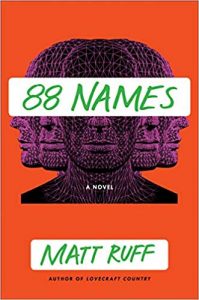Ian Mond Reviews 88 Names by Matt Ruff
 88 Names, Matt Ruff (Harper 978-0062854674, $27.99, 320pp, hc) March 2020.
88 Names, Matt Ruff (Harper 978-0062854674, $27.99, 320pp, hc) March 2020.
The inspiration for Matt Ruff’s new novel, 88 Names, harks back more than 40 years to the day he was first introduced to a “newfangled ‘role-playing game’ called Dungeons & Dragons.” Ruff describes that moment as a life-changing event – “nothing has ever been the same since!” – implying that his successful career as a novelist, which has led to the publication of such critically acclaimed, erudite, and genre-busting work as Bad Monkeys, Mirage, and the extraordinary Lovecraft Country (coming to HBO in 2020), can be laid at the feet of this most famous of table-top games. With his new novel, 88 Names, Ruff has taken this passion for Dungeons & Dragons and all things role-playing and channelled it into a cyberpunk flavoured, near-future thriller.
88 Names takes place two decades from now, at a time where Massively Multiplayer Online Roleplaying Games (more commonly known by the acronym MMORPG) have fully transitioned from the PC and console to virtual reality. Our protagonist, John Chu, spends most of his waking hours hooked up to a VR deck, encountering any number of simulated environments, the most successful of which is Tempest’s Call to Wizardry (a less-than-subtle analogue of Blizzard Entertainment’s World of Warcraft) where John earns a living as a Sherpa. This means he is paid to guide less-seasoned, typically wealthy players through MMORPGs by furnishing them “with playable characters, equipment, and skilled teammates, allowing [the client] to experience high-level game content that would otherwise require hundreds of hours to reach.” Most players view this as cheating; Tempest takes it one step further by treating Sherpa activity as a bannable offence. Avoiding Tempest’s enforcers has never been a problem for John and his cadre of hand-picked, die-hard gamers, but a recent spate of bad luck – the novel opens with one such example – has seen John eat through several of his 88 identities. His posse believe their poor fortune is linked to Darla, a politically incorrect shit-stirrer, team member, and John’s (maybe) girlfriend, now out for revenge following a messy split from the group. John is not convinced, but before he can bury the hatchet with his ex, he is contacted by an avatar named Smith who offers John and his crew $100,000 a week if they will show Smith’s boss, the child-like and innocent Mr. Jones, the world of MMORPGs. John initially believes Darla is pranking him, that is until $100,000 appears in his bank account. When he is then accosted by a Chinese woman, offering to double the money paid by Smith if John spies on Mr. Jones, the gamer starts to suspect that his mysterious client is none other than North Korea’s Great Leader Kim Jong-un.
I do not share Matt Ruff’s enthusiasm for roleplaying games. I’ve never purchased a Dungeons & Dragons sourcebook or been involved in a campaign; I’ve never finished a Sierra Entertainment adventure like King’s Quest or Police Quest (remember them?) without cheating; I’ve never registered a World of Warcraft or EverQuest account – the very thought terrifies me. It’s, therefore, a credit to Matt Ruff’s strengths as a story-teller that I was utterly engrossed in his depiction of a virtual world of epic quests, galactic-spanning space battles, and incredibly violent bank heists. I especially appreciated the chapter Ruff devotes to text-based adventures. It’s not that I played them, but Ruff’s laugh-out-loud evocation of the evil, Machiavellian simplicity of these games brought back nostalgic memories of seeing copies of The Hitchhiker’s Guide to the Galaxy text-adventure (which I was never brave enough to purchase) at my local computer store. What stands out, though, is how much fun Ruff is having combining the conventions of spy fiction – the betrayals, the twists, the contrivances (it just so happens that John’s Mum is a high-ranking counterintelligence officer) – and the freedoms, both creative and personal, afforded by role-playing.
However, in service of 88 Names‘s high-octane plot, Ruff’s treatment of online culture lacks depth. He does acknowledge the tendency for popular MMORPGs to base their characters on racial stereotypes, but the novel’s dramatic tension leans heavily on the superficial notion – most likely influenced by Russian bots and sock-puppets – that you can’t trust a person’s profile on the internet. More than once, John, an experienced gamer, is genuinely surprised to discover that someone he’s known for months, who has identified as either male or female, turns out, biologically, to be the opposite. In one case, this reveal is played as a betrayal, with only scant regard to the idea that the person’s online persona may better reflect their identity. Given that 88 Names is set more than two decades from now, and putting aside the fact that our views on gender and sex are likely to shift significantly over the next five to ten years, let alone 20, I’d like to think that the proliferation of VR, and the intimate, first-person perspective it provides, will assist in breaking down traditional conceptions around how a person identifies.
Although I did expect something a little more chewy and thoughtful from the author of Lovecraft Country, I also recognise that for Matt Ruff 88 Names is a heartfelt love letter to role-playing games, and to that extent the book is a success. To put it another way, while Ruff didn’t convince me to join a D&D campaign, or sign up for World of Warcraft, last night, for the first time, I started playing an online version of The Hitchhiker’s Guide to the Galaxy text game and… immediately went searching for a walkthrough.
Ian Mond loves to talk about books. For eight years he co-hosted a book podcast, The Writer and the Critic, with Kirstyn McDermott. Recently he has revived his blog, The Hysterical Hamster, and is again posting mostly vulgar reviews on an eclectic range of literary and genre novels. You can also follow Ian on Twitter (@Mondyboy) or contact him at mondyboy74@gmail.com.
This review and more like it in the March 2020 issue of Locus.
 While you are here, please take a moment to support Locus with a one-time or recurring donation. We rely on reader donations to keep the magazine and site going, and would like to keep the site paywall free, but WE NEED YOUR FINANCIAL SUPPORT to continue quality coverage of the science fiction and fantasy field.
While you are here, please take a moment to support Locus with a one-time or recurring donation. We rely on reader donations to keep the magazine and site going, and would like to keep the site paywall free, but WE NEED YOUR FINANCIAL SUPPORT to continue quality coverage of the science fiction and fantasy field.







